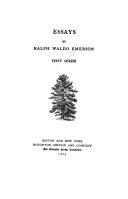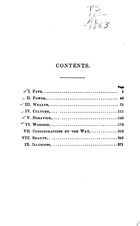Works
Music
Ralph Waldo EmersonEnglish Traits
Ralph Waldo EmersonWorship
Ralph Waldo EmersonBrahma
Ralph Waldo Emerson
Essays: First Series
Ralph Waldo Emerson
Poems
Ralph Waldo EmersonQuatrains
Ralph Waldo EmersonIllusions
Ralph Waldo EmersonThe Rhodora
Ralph Waldo EmersonFamous Ralph Waldo Emerson Quotes
“Happiness is a perfume which you cannot pour on someone without getting some on yourself.”
Variant: Happiness is a perfume you cannot pour on others without getting some on yourself.
Variant: Happiness is a perfume you cannot pour on others without getting a few drops on yourself.
“All life is an experiment. The more experiments you make the better.”
Source: Journals of Ralph Waldo Emerson, with Annotations - 1841-1844
Ralph Waldo Emerson Quotes about men

“The imagination is not a talent of some men but is the health of every man.”
Poetry and Imagination
1870s, Society and Solitude (1870), Books, Letters and Social Aims http://www.rwe.org/comm/index.php?option=com_content&task=category§ionid=5&id=74&Itemid=149 (1876)
“Men love to wonder, and that is the seed of our science.”
Works and Days - generally misquoted as "Men love to wonder, and that is the seed of science."
1870s, Society and Solitude (1870)
1840s, Essays: First Series (1841), History
Context: The difference between men is in their principle of association. Some men classify objects by color and size and other accidents of appearance; others by intrinsic likeness, or by the relation of cause and effect. The progress of the intellect is to the clearer vision of causes, which neglects surface differences. To the poet, to the philosopher, to the saint, all things are friendly and sacred, all events profitable, all days holy, all men divine. For the eye is fastened on the life, and slights the circumstance. Every chemical substance, every plant, every animal in its growth, teaches the unity of cause, the variety of appearance.
1840s, Essays: First Series (1841), Self-Reliance
Context: I read the other day some verses written by an eminent painter which were original and not conventional. The soul always hears an admonition in such lines, let the subject be what it may. The sentiment they instil is of more value than any thought they may contain. To believe your own thought, to believe that what is true for you in your private heart is true for all men, — that is genius. Speak your latent conviction, and it shall be the universal sense; for the inmost in due time becomes the outmost, — and our first thought is rendered back to us by the trumpets of the Last Judgment.
Progress of Culture Phi Beta Kappa Address (July 18, 1867)
1870s, Society and Solitude (1870), Books, Letters and Social Aims http://www.rwe.org/comm/index.php?option=com_content&task=category§ionid=5&id=74&Itemid=149 (1876)
Ralph Waldo Emerson Quotes about life
“Our chief want in life, is somebody who shall make us do what we can.”
Considerations by the Way
1860s, The Conduct of Life (1860)
11 November 1842
1820s, Journals (1822–1863)
Source: Journals of Ralph Waldo Emerson, with Annotations - 1841-1844
Attributed to Emerson in Life’s Instructions for Wisdom, Success, and Happiness (2000) by H. Jackson Brown Jr., as well as numerous on-line sources since, the article "The Purpose of Life Is Not To Be Happy But To Matter" at the Quote Investigator https://quoteinvestigator.com/2014/11/29/purpose/ indicates that this quote is probably derived from various statements first made by Leo Rosten, including the following words delivered at the National Book Awards held in New York in 1962: "The purpose of life is not to be happy — but to matter, to be productive, to be useful, to have it make some difference that you lived at all."
Misattributed
Ralph Waldo Emerson: Trending quotes
“The soul active sees absolute truth; and utters truth, or creates.”
1830s, The American Scholar http://www.emersoncentral.com/amscholar.htm (1837)
Ralph Waldo Emerson Quotes
Give All to Love, st. 4
1840s, Poems (1847)
“Oh, tenderly the haughty day
Fills his blue urn with fire.”
Ode, Concord, July 4, 1857
Bartlett's Familiar Quotations, 10th ed. (1919)
I hope it is somewhat better than whim at last, but we cannot spend the day in explanation. Expect me not to show cause why I seek or why I exclude company.
1840s, Essays: First Series (1841), Self-Reliance
Variant: I cannot remember the books I've read any more than the meals I have eaten; even so, they have made me.
“When it is dark enough, you can see the stars.”
Widely attributed to Ralph Waldo Emerson on the internet; however, a presumably definitive source of Emerson's works at http://www.rwe.org fails to confirm any occurrence of this phrase across his works. This phrase is found in remarks attributed to Charles A. Beard in Arthur H. Secord, "Condensed History Lesson", Readers' Digest, February 1941, p. 20; but the origin has not been determined. Possibly confused with a passage in "Illusions" in which Emerson discusses his experience in the "Star Chamber": "our lamps were taken from us by the guide, and extinguished or put aside, and, on looking upwards, I saw or seemed to see the night heaven thick with stars glimmering more or less brightly over our heads, and even what seemed a comet flaming among them. All the party were touched with astonishment and pleasure. Our musical friends sung with much feeling a pretty song, “The stars are in the quiet sky,” &c., and I sat down on the rocky floor to enjoy the serene picture. Some crystal specks in the black ceiling high overhead, reflecting the light of a half–hid lamp, yielded this magnificent effect."
Misattributed
1840s, Essays: First Series (1841), Self-Reliance
Source: The Complete Prose Works of Ralph Waldo Emerson
“You can never do a kindness too soon, for you never know how soon it will be too late.”
Culture
1860s, The Conduct of Life (1860)
Variant: You cannot do a kindness too soon, for you never know how soon it will be too late.
Widely attributed to Emerson on the internet, this actually originates with "What is Success?” http://www.cas.sc.edu/engl/emerson/Ephemera/Success.html by Bessie Anderson Stanley in Heart Throbs Volume Two (1911) edited by Joseph Mitchell Chapple.
Misattributed
“The louder he talked of his honor, the faster we counted our spoons.”
Worship
1860s, The Conduct of Life (1860)
Variant: The louder they talked of their honor, the faster we counted our spoons.
Source: The Conduct of Life: A Philosophical Reading
“There is an optical illusion about every person we meet.”
Source: Essays and Lectures
The Conservative http://www.rwe.org/the-conservative/ (1842)
“Too busy with the crowded hour to fear to live or die.”
Quatrains, Nature
Bartlett's Familiar Quotations, 10th ed. (1919)
Brahma http://www.humanitiesweb.org/human.php?s=l&p=c&a=p&ID=20567&c=323, st. 1.
Composed in July 1856 this poem is derived from a major passage of the Bhagavad Gita, one of the most popular of Hindu scriptures, and portions of it were likely a paraphrase of an existing translation. Though titled "Brahma" its expressions are actually more indicative of the Hindu concept "Brahman"
1860s, May-Day and Other Pieces (1867)
Variant: If the red slayer think he slays,
Or if the slain think he is slain,
They know not well the subtle ways
I keep, and pass, and turn again.
“In skating over thin ice our safety is our speed.”
Prudence
Bartlett's Familiar Quotations, 10th ed. (1919)
Variant: In skating over thin ice our safety is our speed.
“Wilt thou seal up the avenues of ill?
Pay every debt, as if God wrote the bill!”
Suum Cuique
Bartlett's Familiar Quotations, 10th ed. (1919)
Variant: Wilt thou seal up the avenues of ill?
Pay every debt, as if God wrote the bill!
“For every minute you are angry you lose sixty seconds of happiness.”
No known source in Emerson's works; first found as a piece of anonymous folk-wisdom in a 1936 newspaper column:
: Every minute you are angry, you lose 60 seconds of happiness.
:* Junius, "Office Cat" https://www.newspapers.com/newspage/85995624/, The Daily Freeman [Kingston, NY] (30 December 1936), p. 6
Misattributed
“It is one of the blessings of old friends that you can afford to be stupid with them.”
Source: Emerson in His Journals

“What you do speaks so loudly that I cannot hear what you say.”
Variant: Your actions speak so loudly, I can not hear what you are saying.
1840s, Essays: First Series (1841), Self-Reliance
Source: Self Reliance
Context: A foolish consistency is the hobgoblin of little minds, adored by little statesmen and philosophers and divines. With consistency a great soul has simply nothing to do. He may as well concern himself with his shadow on the wall. Speak what you think now in hard words, and to-morrow speak what to-morrow thinks in hard words again, though it contradict every thing you said to-day. — 'Ah, so you shall be sure to be misunderstood.' — Is it so bad, then, to be misunderstood? Pythagoras was misunderstood, and Socrates, and Jesus, and Luther, and Copernicus, and Galileo, and Newton, and every pure and wise spirit that ever took flesh. To be great is to be misunderstood.
“Write it on your heart that every day is the best day in the year.”
Works and Days
1870s, Society and Solitude (1870)
“Once you make a decision, the universe conspires to make it happen.”
Attributed to Emerson in The Gift of Depression : Twenty-one Inspirational Stories Sharing Experience, Strength, and Hope (2001) by John F. Brown, p. 56, no prior occurrence of this a statement has been located; it seems to be derived from one which occurs in The Alchemist (1988) by Paulo Coelho, p. 22: When you want something, all the universe conspires in helping you to achieve it.
Misattributed


